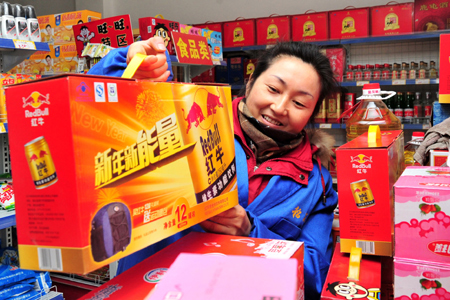Statistics
GDP surged 10.3% in 2010
By Li Woke (China Daily)
Updated: 2011-01-21 11:00
 |
Large Medium Small |
A woman shops at a convenience store in Yichang, Hubei province, on Thursday. China's economy expanded by 10.3 percent, with consumption playing an increasingly important role. [Photo / China Daily]
But NBS chief says the country's 'growth efficiency remains low'

BEIJING - China's GDP growth jumped 10.3 percent year-on-year in 2010, boosted by a faster-than-expected 9.8 percent expansion in the fourth quarter, the National Bureau of Statistics (NBS) said Thursday.
The nation has probably replaced Japan as the world's second-largest economy, but top Chinese officials and analysts say it remains much less developed than Japan in terms of per capita GDP.
The NBS said China's GDP hit 39.8 trillion yuan ($6.04 trillion) in 2010. Japan will release its official figures for 2010 growth on Feb 14. But China reportedly overtook Japan in terms of nominal GDP by the end the second quarter of 2010, based on respective GDP figures. Factors such as the exchange rate could influence the result of such comparison.
Ma Jiantang, director of the NBS, did not compare the sizes of the two economies in detail during the bureau's media briefing on Thursday, but said that China's per capita GDP lags far behind Japan's.
"China's growth efficiency remains low and it has a lot to do in terms of economic restructuring," Ma said. "We must do more to improve the quality of our economic growth."
The per capita GDP in China was about $4,412, compared with $42,431 in Japan, according to calculations the Nikkei newspaper made based on data compiled by the Daiwa Institute of Research and the International Monetary Fund.
Ma said China ranked 124th among 213 economies in terms of per capita income, citing a 2009 World Bank report.
"China has a large population, a weak economic foundation; is relatively lacking in resources if the huge population is taken into consideration, and the number of poor people is very large," Ma said earlier. "So we should have a sober understanding that China remains a developing nation."
China's fast economic growth has also led to problems such as environmental degradation and pollution, analysts said, calling for a restructuring of its growth pattern.
"China's fast growth has come at the expense of a low labor cost and environmental problems," Zhang Weiying, professor of economics at Peking University, said at last week's NetEase Annual Economist Conference.
At Thursday's press conference, Ma said China's economy has quickly recovered from the fallout of the global financial crisis.
"The national economy is generally faring well," Ma said.
"The GDP growth has demonstrated that China has emerged from the effects of the world economic crisis," said Yao Jingyuan, chief economist of the NBS.
| |||||||
China has decided to seek a more balanced growth model and reduce the proportion of exports and investment in the economy. Premier Wen Jiabao said earlier that China will address "structural problems" and "we can rely on stimulating domestic demand to stabilize and further expand the Chinese economy".
The country is aiming to reform its personal income and property taxes, increase salaries and improve education, housing and social security to boost domestic demand. All those measures will encourage consumption.
Growth may no longer be a big concern for China, but analysts say that inflation certainly is.
The Consumer Price Index, a main gauge of inflation, reached 3.3 percent last year, exceeding the targeted 3 percent. It went up to 5.1 percent in November, the highest in more than two years, before dropping to 4.6 percent in December.
The People's Bank of China, the central bank, has increased banks' reserve-requirement ratio seven times and raised its benchmark interest rates twice since January 2010 to curb inflation.
Bloomberg contributed to this story.
| 分享按钮 |


